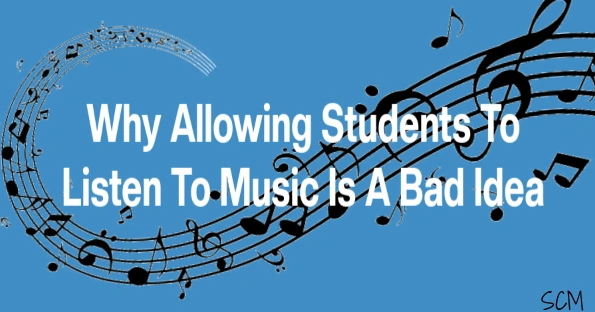
More and more teachers are allowing students to listen to music in class.
Perhaps not during direct instruction. But once students are let go to work independently, in go the earbuds.
It’s odd to me, to be honest, that anyone would think this is okay. But the trend has only grown in the past year.
Now students are beginning to see it as a right, as if it’s bequeathed to them by the gods of technology. After all, they’re not bothering anyone. They’re not being disruptive.
So what’s the harm?
Well, it’s well established that the notion of multitasking is a myth. The brain can’t concentrate on more than one thing at a time.
Music alone, however, isn’t the problem. Classical music, for example, has been shown to enhance concentration. It does this by lowering blood pressure and improving mood.
When you feel good and energetic, you learn better. This happens subconsciously. Classical music provides a background complement rather than a competing stimulus.
It drowns out distraction and heightens focus on the object of attention.
But students aren’t listening to Chopin or Beethoven. They’re listening to music with lyrics. Lyrics are meant to speak to the listener. They’re meant to tell a story and elicit emotion.
They are, by nature, distracting.
According to research, multitasking alone (i.e., switching back and forth between two or more tasks) can decrease IQ by ten points. Add lyrics, which further impairs cognitive ability, and you have a powerful one-two punch.
Think of trying to read or do even basic math computations while a friend shares a gossipy story. It can’t be done, at least not very well.
Another consideration is the content many students are listening to, which promote—and some studies link to—violence, alcohol and drug use, and sexual behavior.
So, why are teachers allowing it?
Well, some give in to just about anything in an attempt to appease students into better behavior. They try to be the cool teacher who lets students listen to Cardi B or Snoop Dog.
Others are afraid. They don’t want to confront students or take away their cell phones and airpods. They don’t want the pushback. So they capitulate.
I understand. It’s become an uphill battle. Even with rules, students listen to music anyway and dare teachers to follow through. This is happening predominantly at the high school level, but is also trickling down to lower grades.
And as more and more teachers allow it, the pushback grows stronger. The entitlement deepens. Hiding a bud in one ear or behind a cascade of hair becomes more rampant.
But you mustn’t give in.
Allowing students to listen to music while trying to concentrate is terrible for them. It cuts their comprehension and performance dramatically. And that’s just for those who are actually trying to learn.
The truth is, most students listen to music to escape your class. They have no intention of doing their best or focusing on their work.
So put an end to it. Don’t allow it to happen. Explain to your students why it hurts them and then enforce it. Commit to it, like any other rule.
Your students may not appreciate you now. But they will respect you and appreciate you in the long run. How they feel about it, however, isn’t your concern.
What is your concern, and your job, is to provide a world-class education. So Monday, or whenever you next see your students, even if you’re the only one at your school, take a stand.
Turn against the rising tide. Do it for them. Your school and fellow teachers may be failing your students, but that doesn’t mean you have to.
PS – My new book Inspire is now available. Click the link to learn more.
Also, if you haven’t done so already, please join us. It’s free! Click here and begin receiving classroom management articles like this one in your email box every week.





More Stories
How Busy Parents Can Unlock Extraordinary Growth in Their Child’s Education
How Special Needs Advocates Empower Families
Why Special Needs Preschools Are Essential for Growth